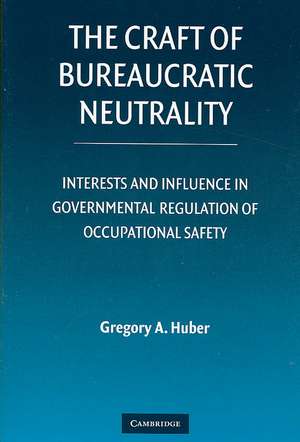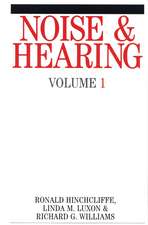The Craft of Bureaucratic Neutrality: Interests and Influence in Governmental Regulation of Occupational Safety
Autor Gregory A. Huberen Limba Engleză Hardback – 6 mai 2007
Preț: 693.18 lei
Preț vechi: 778.85 lei
-11% Nou
Puncte Express: 1040
Preț estimativ în valută:
132.64€ • 136.84$ • 110.69£
132.64€ • 136.84$ • 110.69£
Carte tipărită la comandă
Livrare economică 26 martie-09 aprilie
Preluare comenzi: 021 569.72.76
Specificații
ISBN-13: 9780521872799
ISBN-10: 0521872790
Pagini: 266
Ilustrații: 26 tables
Dimensiuni: 152 x 229 x 19 mm
Greutate: 0.49 kg
Editura: Cambridge University Press
Colecția Cambridge University Press
Locul publicării:New York, United States
ISBN-10: 0521872790
Pagini: 266
Ilustrații: 26 tables
Dimensiuni: 152 x 229 x 19 mm
Greutate: 0.49 kg
Editura: Cambridge University Press
Colecția Cambridge University Press
Locul publicării:New York, United States
Cuprins
1. Bureaucratic power and strategic neutrality; 2. Political conflict and the Occupational Safety and Health Act; 3. From regulatory search to enforcement; 4. Federal oversight and state OSH Act enforcement; 5. Conclusion.
Recenzii
"Strategic Neutrality is a must-read for students of American political institutions, public administration, and public policy. Professor Huber’s book has a new take on a set of ageless questions: to what extent will politics influence bureaucratic decisions, and will politics encourage officials to ignore their policy expertise? Huber argues and convincingly shows that it can be politically optimal for an agency to adopt a norm of professionalism or "neutrality."
Brandice Canes-Wrone, Princeton University
"Greg Huber's incisive study of the strategic value of neutral competence is one of the most important studies of public bureaucracies to appear in the last twenty years. Like the Roman god Janus, Huber's strategic neutrality has two faces. One looks down, offering a tool for managers to control their subordinates; the other looks out, as managers seek to improve the autonomy of their agencies. Huber backs up his insight with a full analysis of the implementation of the Occupational Health and Safety Act, showing how agency bureaucrats without a strong political hand have nevertheless been able to administer the law consistently even in the face of sometimes fierce local political demands. This is political analysis as it ought to be done."
Bryan D. Jones, University of Washington
"An impressive addition to the literature on public bureaucracies. On the theoretical level, it is provocative. As a study of the behavior of a regulatory agency, it is insightful. And as a mode of research, it is thorough and sophisticated. All in all, an illuminating contribution to the field."
Herbert Kaufman, Yale University
"Huber has written an innovative and important book about American politics and public policy making. It uses a compelling blend of methods to show how bureaucratic actors make strategic choices to balance external political pressure and internal management imperatives. Theoretically and empirically rich, it shows how these choices have concrete influence on the way agencies make and implement public policy. Huber shows how bureaucratic officials behave in a strategically neutral fashion to blunt political opposition while securing internal agency compliance and a significant record of regulatory enforcement. Fundamentally, Huber helps us think about bureaucratic actors and American politics and policy in a new way."
Dave Lewis, Princeton University
"In The Craft of Bureaucratic Neutrality, Greg Huber provides a model of how thoughtful and well-informed data analysis can illuminate important issues in regulatory policy and politics. In his examination of the relation between political science and public administration, he challenges a number of accepted findings about regulatory enforcement."
John Mendeloff, University of Pittsburgh
"Why are government bureaucrats sometimes susceptible to political pressures, while other times they act independently? The answer lies in the concept of strategic neutrality, which explains how bureaucrats shape, as well as respond to, their political environment. Huber's analysis is insightful, careful, and convincing."
Charles Shipan, University of Michigan
"This is a sensible and compelling insight, theoretically well supported...and one that scholars should incorporate in future bureaucratic studies"
Dawn M. Chutkow, Law and Politics Book Review
"Huber mines a mountain of data...The quality of his empirical analysis of OSHA's implementation strategies is truly impressive." Graham K. Wilson, Boston University: American Politics Book Reviews
Brandice Canes-Wrone, Princeton University
"Greg Huber's incisive study of the strategic value of neutral competence is one of the most important studies of public bureaucracies to appear in the last twenty years. Like the Roman god Janus, Huber's strategic neutrality has two faces. One looks down, offering a tool for managers to control their subordinates; the other looks out, as managers seek to improve the autonomy of their agencies. Huber backs up his insight with a full analysis of the implementation of the Occupational Health and Safety Act, showing how agency bureaucrats without a strong political hand have nevertheless been able to administer the law consistently even in the face of sometimes fierce local political demands. This is political analysis as it ought to be done."
Bryan D. Jones, University of Washington
"An impressive addition to the literature on public bureaucracies. On the theoretical level, it is provocative. As a study of the behavior of a regulatory agency, it is insightful. And as a mode of research, it is thorough and sophisticated. All in all, an illuminating contribution to the field."
Herbert Kaufman, Yale University
"Huber has written an innovative and important book about American politics and public policy making. It uses a compelling blend of methods to show how bureaucratic actors make strategic choices to balance external political pressure and internal management imperatives. Theoretically and empirically rich, it shows how these choices have concrete influence on the way agencies make and implement public policy. Huber shows how bureaucratic officials behave in a strategically neutral fashion to blunt political opposition while securing internal agency compliance and a significant record of regulatory enforcement. Fundamentally, Huber helps us think about bureaucratic actors and American politics and policy in a new way."
Dave Lewis, Princeton University
"In The Craft of Bureaucratic Neutrality, Greg Huber provides a model of how thoughtful and well-informed data analysis can illuminate important issues in regulatory policy and politics. In his examination of the relation between political science and public administration, he challenges a number of accepted findings about regulatory enforcement."
John Mendeloff, University of Pittsburgh
"Why are government bureaucrats sometimes susceptible to political pressures, while other times they act independently? The answer lies in the concept of strategic neutrality, which explains how bureaucrats shape, as well as respond to, their political environment. Huber's analysis is insightful, careful, and convincing."
Charles Shipan, University of Michigan
"This is a sensible and compelling insight, theoretically well supported...and one that scholars should incorporate in future bureaucratic studies"
Dawn M. Chutkow, Law and Politics Book Review
"Huber mines a mountain of data...The quality of his empirical analysis of OSHA's implementation strategies is truly impressive." Graham K. Wilson, Boston University: American Politics Book Reviews
Notă biografică
Descriere
This book identifies the political origins of bureaucratic neutrality.













